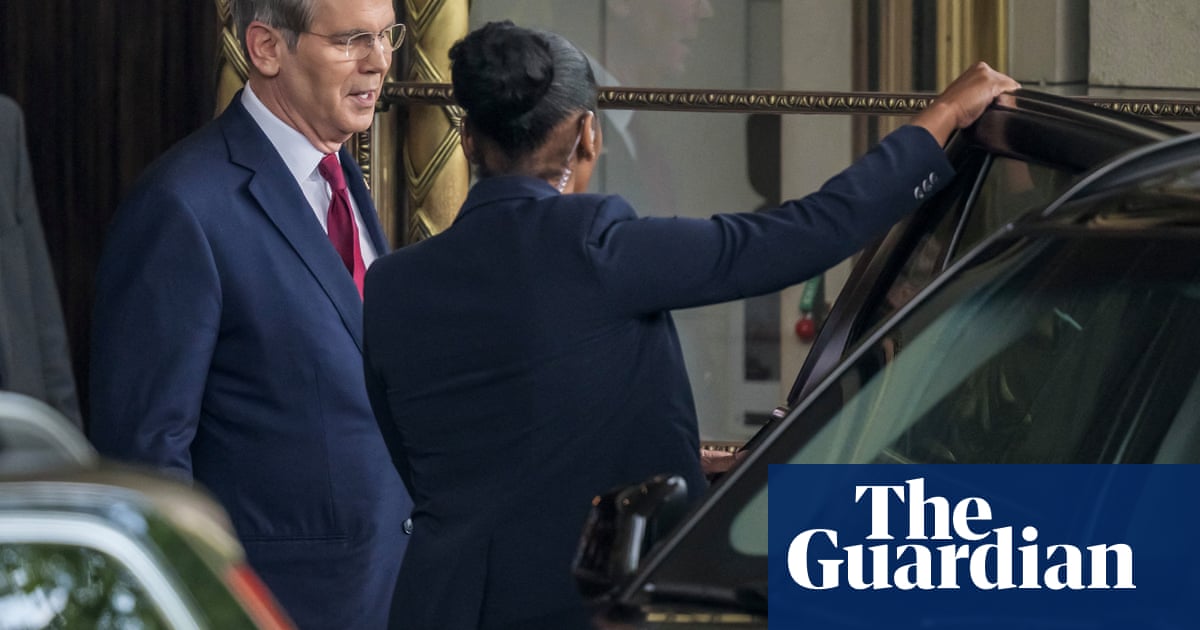In January 1997, I went to Paris to interview the great American surrealist film-maker David Lynch, who died at the end of last month aged 78. Lynch was in an upbeat mood because the European reviews for his new feature, Lost Highway, had been glowing – even in Spain, where the film had been screened to critics with the reels in the wrong order. “I heard about that!” he laughed. “It gives you an indication of how the human mind can work with pieces even when they’re out of order. How it seeks to make sense of something, and makes it work somehow. It’s a beautiful thing.” And then he laughed some more.
Over the years, I had the privilege of interviewing Lynch many times, talking about his movies, music, paintings and his passion for transcendental meditation. As he told me when I spoke to him on stage for the Guardian in 2007 after a screening of his latest (and, as it turned out, last) feature, Inland Empire: “It allows any human being to dive within and transcend and experience the unbounded, infinite ocean of pure vibrant consciousness – bliss, intelligence, creativity, love, power, energy, all there within.”
Lynch’s interest in TM dated back to the days of his nightmarish first feature, Eraserhead (1977; not available to stream), a midnight-movie classic in which Jack Nance tends to an alien-looking baby, its body swaddled in bandages from which only a monstrous head and neck emerge. Lynch described Eraserhead as “a dream of dark and troubling things”. I noted that, if TM created such positivity, people might wonder about all the darkness in Lynch’s films. “Exactly!” he replied. “I thought when I started meditation that I was going to get real calm and peaceful and it’s going to be over. It’s not that way, it’s so energetic. It’s tremendous creativity. The artist doesn’t have to suffer to show suffering. You gotta understand it. You don’t have to die to do a death scene. You just have to understand it in your own way. But understanding is the thing, understand this suffering, this anger, this character.”

The ominous soundtrack of Eraserhead – a symphony of industrial noises and otherworldly windscapes – was created in partnership with Alan Splet, the sound designer and sound editor whose collaborations with Lynch ran from early shorts such as The Grandmother (1970) to features such as Dune (1984) and Blue Velvet (1986). It was Splet who helped Lynch conjure the steam-and-smoke-filled sounds of Victorian England in The Elephant Man (1980) – a film exec-produced by Mel Brooks, who described Lynch as “Jimmy Stewart from Mars”. When I visited Lynch at his recording studio in Los Angeles several years after Splet’s death in 1994, he showed me the plaque marking the spot in the floor of his mixing console where some of Splet’s ashes were placed, his spirit continuing to guide Lynch in his audio endeavours.
Lynch’s other great sonic collaborator was composer Angelo Badalamenti, who cameos as a nightclub pianist in Blue Velvet, and plays the coffee-spitting Luigi Castigliane in Mulholland Drive (2001), which began life as a rejected TV pilot and went on to be voted film of the decade by everyone from Cahiers du Cinéma to the Los Angeles Film Critics Association. The master of the suspended chord, Badalamenti’s scores for Lynch’s films ranged from the violent Palme d’Or winner Wild at Heart (1990) to sentimental oddity The Straight Story (1999) via the TV series Twin Peaks (1990-1, 2017) and its spin-off feature Fire Walk With Me (1992). One of the proudest moments of my career was being asked by Lynch and Badalamenti to provide the liner notes for a vinyl reissue of the Fire Walk With Me soundtrack – a film I had loved and championed on its first release, but which had been derided by critics and rejected by audiences, only to be reassessed years later as a lost masterpiece.

As for Lynch, anyone who saw his turn as John Ford in Spielberg’s The Fabelmans (2022) will know just how funny he could be. My own favourite memory of Lynch comes from a hilarious moment in that Inland Empire interview when I asked a very long and involved question about whether the recurrent image of electricity arcing in his films somehow “relates to what you think about the synaptic arcs in our brains”. If you watch the video, you can see Lynch silently luring me in – because he knew (as did I) that we’d addressed this exact same question just a few months earlier in LA, and he’d given me a fulsome answer. But this time he just let me tie myself up in knots before leaning in to microphone, pausing for a moment, and then saying with a smile: “No.”
The audience burst into riotous laughter, and well they might. It was one of the best-timed gags I have ever seen, and I remain hugely proud to have been the punchline.
All titles in bold are available to stream
What I’m also enjoying

The Brutalist
(In cinemas)
Brady Corbet’s tale of a Hungarian emigre trying to make his way in post-second world war America won a Silver Lion at Venice last year and is now up for 10 Oscars, including best picture. It’s a timely film, all the more relevant in the wake of the border-closing mania currently gripping the US and elsewhere.

Yachts: Missing in Action – The Lost Tapes 1980-81
(4BE)
From the vaults of one of my favourite bands of all time, who bridged the gap between post-punk powerpop and lyrical balladry, comes this barnstorming collection of 17 unreleased recordings, originally planned for Yachts’s unrealised third album. Hats off to band members Henry Priestmanand Martin Watson, and superfan Chris Topham, for wrangling this essential item.

 3 months ago
52
3 months ago
52













































